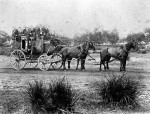VINES, Thomas
Thomas Vines was born in Geelong on 29 December 1868. His father was Joshua Vines who, according to a brief obituary was 'a member of the old coaching firm of Vines and McPhee, who ran many coaches in the Ballarat, Wimmera and Western disricts under the style of Cobb and Co., in the early days.'
Thomas was educated at Geelong Grammar. He became a horse dealer and was involved in the supply of horses to South Africa during the Boer War. In 1898 he sailed in charge of 150 horses housed in boxes on the deck of the Ashley. The ship was struck by heavy weather just after it left Western Australia which damaged some of the boxes, and it had to retun to port. No horses were injured, and after repairs the trip resumed. In 1900, and then described as a horse buyer for Mr. C.F. Glasscock, he was responsible for supplying 400 horses which meant travelling all over the state to make purchases. Again he was responsible for their care on the voyage to South Africa. He had also been a driver in his father's business and later became manager of the Hamilton-Penola coach service, which was part of that business.
When he enlisted on 16 June 1915 Thomas gave his occupation as Clerk (Stead Remount Depot) and stated that he had spent three years with the Light Horse in Hamilton. He gave his address as 90 Powlett Street, East Melbourne. He was 5ft 8ins and 14 stone. His complexion was fresh, eyes blue and hair dark brown. He was appointed to the 1st Remount Unit, Squadron No. 2 at Maribyrnong. On 1 November 1915 he was promoted from Private of Acting-Sergeant.
He embarked on 12 November 1915 on the Orsova. Lt. Andrew Barton (Banjo) Paterson was on the same ship as a member of the 2nd Remount Unit. Another passenger, Trooper H.H. Howard (Rough Rider) wrote of the voyage and their arrival in Egypt:-
'We had a splendid trip on the Orsova. There were over 100 nurses with us, and altogether there were about 1400 on board. We had small tournaments, and a concert twice a week. ..... It is Winter in Egypt, hot through the day and cool at night, with sand everywhere you look. We are stationed at Zeitoun, about half an hour's ride in the tram from Cairo. Every nation in the world is in Cairo. Some of the boys have a 'Melbourne Cup' up the streets on the donkeys, but the donkeys only go as fast as they like. Cairo is a 'real break-up'. As a matter of fact, there is anything and everything in Cairo. The beer is good, but the spirits 'up to putty'.
Thomas was taken on strength of AIF Headaquarters (Egyptian Section) on 22 March 1916 and a week later was transferred to Remounts Cairo. He embarked for England 29 March 1916 and was stationed at Tidworth Camp. In October he was sent to Rouen, France, to join the 1st Anzac Australian Command Headquarters. He was appointed 2nd Lieutenant on 9 April 1917. He was detached from his unit and sent to AIF Headquarters, Tidworth, England on 12 April 1917. He was transferred to General Infantry Reinforcements on 15 September 1917 and taken on strength of 2nd Australian Divisional Train and placed on Regiental Seconded List 21 september 1917. A medical report dated 7 October 1918 stated that he was employed on Company work but was anxious to become General Service. The report continued that he was over 50, took a 'good deal of alcohol and probably has done for years.' He remained in England until his return to Australia on 1 November 1919.
After the war Thomas remained in government service and in 1927 he was transferred from Myrtleford, where he had been serving as inspector of soldier settlements, to Melbourne. In 1933 he wrote from the Patents Office, Bourke Street, requesting a copy of his Certificate of Discharge to put in with an application to join the Census Department.
He died on 8 September 1956 leaving several children, one of whom, Thomas Nicholls Vines, also enlisted. His wife, Christina, predeceased him in 1927 at Myrtleford.
Can you help?
Can you correct or provide more information about this person?
Or are you able to help with this history project?
- Family stories and records including photos, documents and memorabilia?
- Stories or information in books, newspapers and on-line?
- Memorial plaques in churches and public places?
- War memorial, church, national and state archives?
If so, please Contact the East Melbourne Historical Society.

